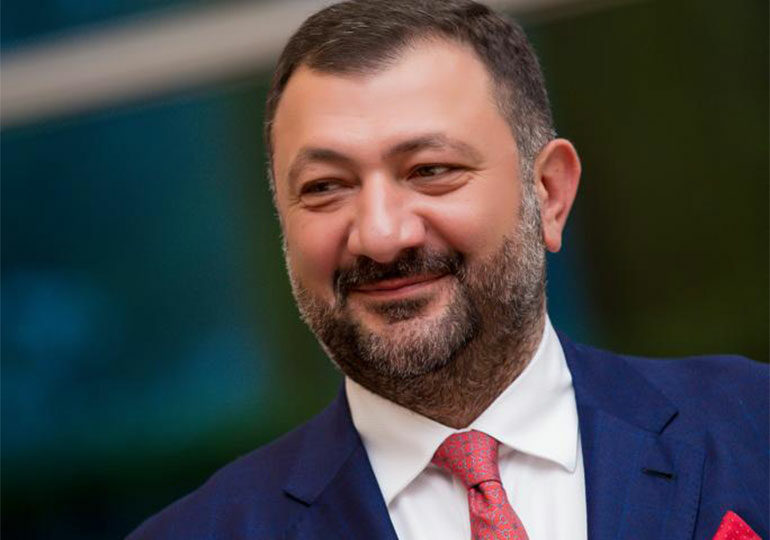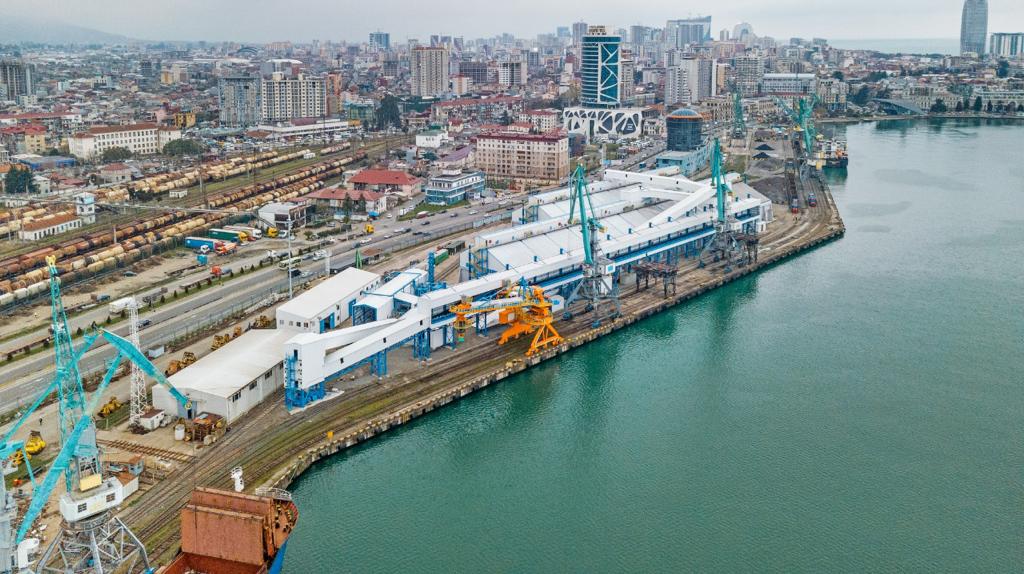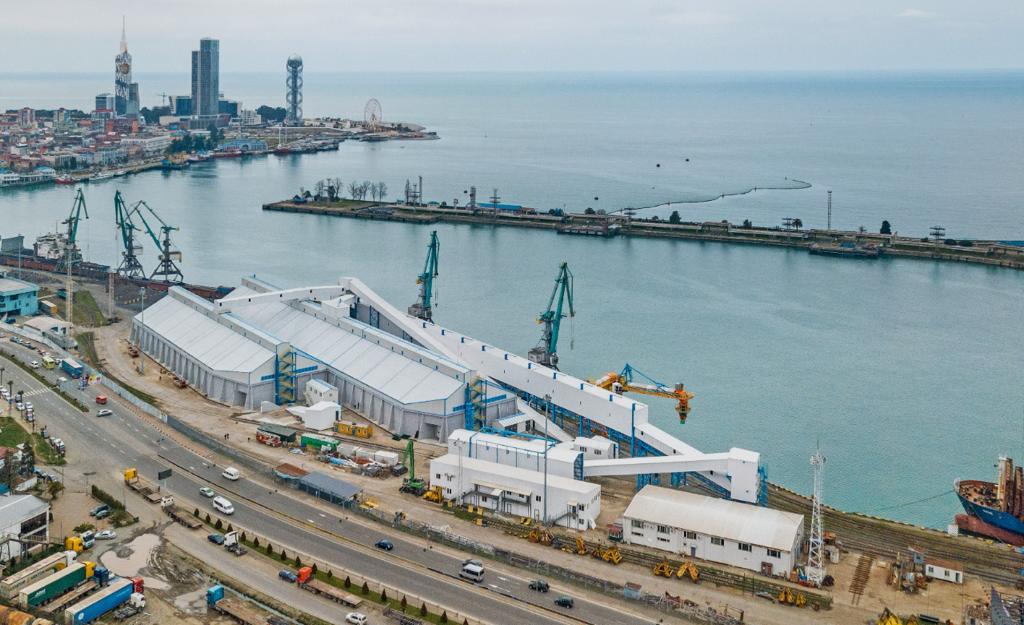26.10.2021
Forbes Georgia About Our Terminal
Interview with General Director – Mamuka Murjikneli

Start of the New Multimodal Terminal in Batumi
The opening of a brand new multimodal terminal in the Batumi Port in April has garnered a lot of attention. The terminal that ensures the reception, storage and transfer of the mineral fertilizers, namely carbamide, has been called a regional-scale project. It connects cargo from Central Asian countries to the Western market via Georgia. The project was implemented through the $25 million investment in partnership with Trammo Inc., one of Forbes’ 250 largest private American companies, and ADIA. Mamuka Murjikneli has been appointed General Director of the terminal. Previously, since February 2019, he held the position of the Ambassador Extraordinary and Plenipotentiary of Georgia to Turkmenistan. Below is the interview with Mr. Murjikneli having proven experience working in a private business.
You were appointed General Director of the new Batumi Multimodal Terminal a few months ago. What are your mission and plans for this organization?
Based on my previous experience, I have spent a lot of time in Central Asia: I was the Ambassador of Georgia, I also supervised Central American and the Caucasus units while working for an American company. In 2015-2017, I worked as Vice President for International Relations at Skyland Petroleum Group. Hence, the offer to take the position of the head of this terminal presented a rather interesting challenge for me. Indeed, I took up the offer and we have big future plans ahead. I am delighted to work with professionals and large partners. The terminal got off to a very good start, dynamics are quite fast and we expect even more growth and development.
$25 million was invested in the construction of the terminal. Who are the investors and what are their main interests?
Three partners are involved in the implementation of the terminal project. Among them is the American company Trammo Inc., Uzbek company Covalent, known for mineral and fertilizer trade in Central Asia. The third partner is the Georgian company ADIA. The American company is one of the largest in the world not only considering the production and sale of mineral fertilizers, but also in the volume of investments. The fact that such an investor was interested in investing money in Georgia is of utmost importance both for our terminal and for the region as a whole. The actions taken by foreign investors show that they believe in the future development and progress of our country. In this regard, ensuring stability is crucial.
Ultimately, we achieved the synergy of three partners from different parts of the world. As a result of mutual interests, they decided to build a terminal in Georgia.

While the interest of the Georgian and Uzbek companies seems clear, what would you say is the reason for the American company investing in the project?
Central Asia is a region with the production rates increasing every year. Our partners saw this potential and decided to become more active in our passageway by owning a terminal. Georgia is the most convenient and financially profitable passageway for shipping goods from Central Asia to Europe and the United States. Thus far, the cargo from our terminal has been shipped to Europe and America and it will be mainly transferred to these continents. Thus the engagement of the American company in the project is to be expected.
What opportunities does the existence of such a terminal present for our country?
The more infrastructure projects are implemented in the country, the more attractive it becomes. Georgia has always been a gateway between Asia and Europe. Today we find ourselves regaining the historic function of being a passageway and connecting cargo from Central Asia to the rest of the world. Besides, for example, it has been 26 years since I lived in Georgia and when I saw such interesting projects being implemented, I decided to return to my homeland and start getting involved. I think that as a result of such projects, more of our fellow citizens will be willing to return to Georgia.
What is more, we work with new technologies on a daily basis. This gives our employees a great deal of valuable experience which translates into the increase in the number of qualified staff in Georgia, who will then be able to use this experience not only in Georgia, but also in similar terminals located in Europe, America, and other leading countries.
What are the primary results of the terminal? How much interest has it managed to garner?
The interest is growing daily. In September, an exciting conference was held in Batumi for companies engaged in fertilizer production, procurement and logistics. The participants were very interested. In general, the demand for fertilizers in the world is growing. As for our shipments, we can say that we are one of the forerunners in terms of dry cargo transportation in Batumi Port.

We have been discussing the terminal that receives, stores and later ships mineral fertilizers to the western market. How is security maintained and ensured?
When the construction of the terminal first began, our specialists carefully studied the security measures of similar terminals located in Europe and America. Our terminal was built on the basis of respecting these measures. We are confident in saying that all security measures are ensured in our terminal. We have a modern fire system that is checked weekly. We also have our own water tank. It is also worth noting that the cargo we handle is carbamide, which, in itself, represents a rather safe type of cargo. Cargo is handled in a completely enclosed space, including the storage and then its later shipment. We use a conveyor belt system, which means that the cargo is automatically transferred from the wagon to the warehouse and from there it is loaded directly into the enclosed space on the ship. Consequently, the risk of cargo dispersion in the air is minimized. Earlier when the carbamide was received at the Batumi Port, it was unloaded in an open space. Conversely, modern systems are used when handling cargo today, ensuring high-level protection. We have implemented all the best practices existing in the world today.
Prior to the opening of the terminal, what were the ways of transporting this particular type of cargo from Central Asia to Europe? How are you planning to compete with them?
There exist different routes; the northern route, for example, the Volga-Don Canal, which is used during the summer. However, we are able to ensure the intake of very large ships and load 45-50 000 tons of cargo. Previously, a maximum of 30,000-ton ships could be loaded in Georgia. Our first ship was loaded with 44,000 tons, which is an all-time high number for dry cargo in Georgia. Unloading is also way faster in our terminal. Those engaged in buying and selling this particular product, will certainly seek to have the product delivered as quickly and efficiently as possible. As I mentioned, the production of this type of good is growing in Central Asia and thus, the demand for the usage of similar terminals is also increasing. The faster and the more economically profitable way of transportation we offer, the more cargo will come our way.
Based on the previous positions you held, you are well acquainted with the region of Central Asia. What other types of cargo can be transported from this region?
I have been working in Central Asia for the last 16 years and I can say that it produces petroleum products, chemical products, aluminum, cotton, new factories are opened every year. Our terminal can handle all types of dry cargo, however, today we work only with carbamide.
What are the plans for the future development of the terminal?
Requirements change and technologies evolve each year. We try to keep up with trends. We have signed a memorandum with the port of Azerbaijan in order to jointly manage the mineral fertilizer terminal located in Azerbaijan. Hence, we are going to be represented in the port of Azerbaijan, contributing to the further development of this passageway and the acceleration of cargo transportation. We have recently completed the construction of a so-called bunker in the Port of Alat, which will also speed up the cargo handling. This is the first step prior to the construction of a terminal in Azerbaijan. Our main mission is for the cargo to reach its final destination as quickly and efficiently as possible.
Tags: Forbes Georgia, WEIG
